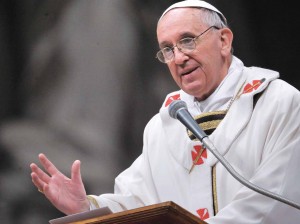Front Row With Francis: Anointment of the Sick
 At his Weekly General Audience on Wednesday, February 26, 2014, Pope Francis got to talk about one of his favorite topics: care of the sick and the infirmed, by reference to the Anointment of the Sick. The Pope tackled the ‘taboo’ quality of the misunderstood Sacrament, acknowledging that “there is a bit of this idea that after the priest comes, the hearse will come next.” The crowd present in St. Peter’s Square began to applaud. The Pontiff exclaimed, “This is not true!”
At his Weekly General Audience on Wednesday, February 26, 2014, Pope Francis got to talk about one of his favorite topics: care of the sick and the infirmed, by reference to the Anointment of the Sick. The Pope tackled the ‘taboo’ quality of the misunderstood Sacrament, acknowledging that “there is a bit of this idea that after the priest comes, the hearse will come next.” The crowd present in St. Peter’s Square began to applaud. The Pontiff exclaimed, “This is not true!”
Part of the misunderstanding may be due to way the Anointment of the Sick is portrayed in media reports. Often, it is reported as the resignation that someone is about to die, when loved ones finally resort to the Sacrament in the expectation that the moribund is about to die. Some of us recall how, when the Sacrament was administered to Blessed John Paul II, the Vatican had to explain that it did not mean the Pontiff was drawing his last breath.
Another reason for the confusion may be that the Sacrament was formerly known as the “Extreme Unction”—a term that also suggests the end of the line. The emphasis of the Sacrament was reoriented after the Second Vatican Council away from the “extreme” and more toward the “unction”—the part that Pope Francis is glad to accentuate.
As noted in our prior installment of “Front Row With Francis,” Pope Francis has made the theological value of Mercy a cornerstone of his pontificate and, as I explained in my blog, he has made his Wednesday General Audiences a particular showcase for his teachings on Mercy. In particular, Francis has made it a point to physically embrace and show affection to the handicapped and infirmed.
In one recent example that made headlines around the world, Francis embraced Vinicio Riva, a man inflicted with neurofibromatosis, which has left him completely covered from head to toe with growths, swellings and sores.
For Francis, this emphasis on a personal touch is not simply a matter of charisma, but a reflection of the presence of Christ. “Every time we celebrate (the Anointment of the Sick),” Francis said during the Audience, “the Lord Jesus, in the person of the priest, comes close to the one who suffers and is gravely ill or elderly.”
At a daily morning Mass the Monday before, Francis had noted the mercy displayed by Christ in performing an exorcism (Mark 9,14-29). “Jesus lowers Himself [and] takes up the boy,” Francis noted, highlighting Christ’s tenderness.
The Pope explained that Anointing the Sick also reflects the mercy of the Good Samaritan in Jesus’ parable from the Gospel of Luke (10:30-35). “The parable says that the Good Samaritan takes care of the suffering man, pouring oil and wine on his wounds,” the Pontiff said.
He also pointed out that the Sacrament is mandated “explicitly and precisely” in the Letter of James (5:14-15). But more than hard rules, “Jesus’ gestures of so much tenderness make us realize this: that our doctrine, let us say, or our following Christ, is not an idea,” the Pope had said earlier at his Monday Mass. Thus, Anointing the Sick extends the mercy of Christ.
Previously: Francis on Confession

